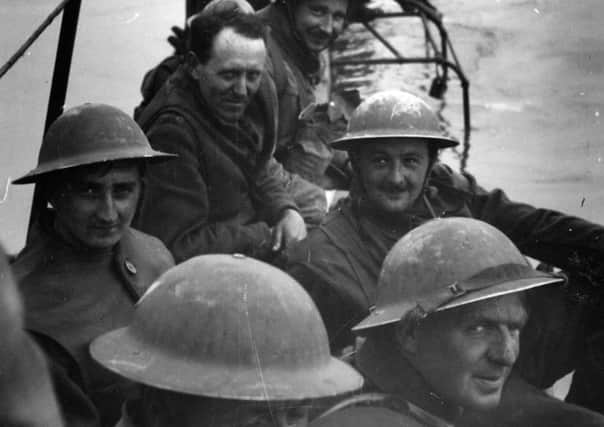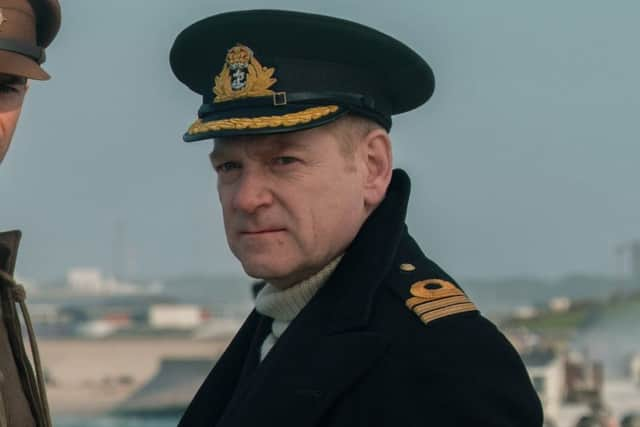Young Ulster gunners integral to rearguard action that shaped WWII


This weekend, Christopher Nolan’s portrayal of Dunkirk appeared in our cinemas with the poster proclaiming: ‘An event that shaped our world.’
And a new generation will be introduced to what is both Britain’s favourite military disaster and epic escape.
Advertisement
Hide AdAdvertisement
Hide AdThe fate of Europe decided on a stretch of beach in France and Belgium, the name Dunkirk becoming a motif for British spirit far beyond any ability to queue under fire.


A triad of events that summer – Winston Churchill’s refusal to seek terms, the unexpected return of much of the British Expeditionary Force (BEF) and the RAF’s victory in the Battle of Britain – ensured that the war would not be lost.
It still had to be won though.
The most recent film treatment, Joe Wright’s ‘Atonement,’ (2007) has at its core a seven-minute tracking shot which powerfully portrayed the pathos, agony and chaos of a disintegrating army floundering. Stranded. Beached.
However, Dunkirk was as much a successful fighting retreat, a withdrawal under pressure in which crucially the Army did not collapse.


Advertisement
Hide AdAdvertisement
Hide AdPerhaps Nolan’s decision to frame the film as a triptych of stories of land, sea and air will approach a more comprehensive appraisal.
And now, just as the last survivors of the Second World War depart the stage, its timing appears opportune – new generations are given vivid Technicolour glimpses of the stories told and retold of the citizen soldiers who at such cost resisted fascism.
Their achievement? To lay the basis for a post-war stability, now incessantly tested by crises.
Alongside Tom Hardy and Cillian Murphy, it seems appropriate that Northern Ireland’s own Kenneth Branagh is cast as a naval officer.
Advertisement
Hide AdAdvertisement
Hide AdFor few know of the part played by many young Northern Irishmen, not only in the Royal Ulster Rifles and Artillery Regiments but also in Territorial Army Units, one of which had a personal connection to my family.
The 3rd (Ulster), Searchlight Regiment of the Royal Artillery, Light Anti-Aircraft, was sworn in on a Belfast Indian summer evening in September 1939.
And from these 1,000 young gunners, one Battery (12th ) went on to light up the skies over Dunkirk, assisting the French Anti-Aircraft (AA) defence while the other two (10th and 11th ) were deployed inland as part of the Allies AA screen in Northern France.
From May 10, when the German army launched its blitzkrieg, the night fighters of the 10th and 11th Batteries were deployed virtually round the clock, their AA duties combined with daytime infantry defence of canals and towns.
Advertisement
Hide AdAdvertisement
Hide AdFrom his command post in Dunkirk, 12th Battery’s Major Heard was given a unique and horrifying grandstand view of the tragedy unfolding in the city and port.
On the morning of May 10 at 0600, he observed: “Stukas swooping down like dark birds of prey releasing their bombs at a French destroyer in the channel to the harbour.”
From the night of 15th onwards he reported: “Very heavy raids of high explosives and incendiaries. And there were loud explosions in the port, multiple fires in Dunkirk and a dense pall of smoke rising.”
A pillar of smoke by day and fire by night become a beacon for retreating troops.
Advertisement
Hide AdAdvertisement
Hide AdAs the BEF fell back to the coast the regiment’s 10th and 11th Batteries now co-operated more closely, blowing bridges, and fighting as infantry.
On May 22 they were ordered west to Gravelines to assist French troops piling chairs, tables, desks and carts on top of each other, barricading bridges south of the town.
With a company of Green Howards, they waited for the German tanks to arrive.
It was furniture, rifles, anti-tank and machine guns against Panzers.
Advertisement
Hide AdAdvertisement
Hide AdUnderstated war diaries show they “resisted all attempts by the 1st Panzer Division to take those bridges”.
Eventually, ordered to withdraw to the beaches they took what little cover there was in the dunes, or formed lines snaking into the sea, in multiple attempts to reach the smaller boats, until the East Mole (Breakwater) was deployed as an emergency jetty where large ships could moor and speed the evacuation.
In all, 186,587 British and over 125,000 French soldiers were lifted from the Mole and the beaches in the nine days from May 27 to June 4 – the achievement breathtaking.
Churchill called it “a miracle of deliverance” – the returning BEF, wrapped in their tattered glory, delivering enough boots on the ground in southern England to ensure that resistance to invasion would not be futile.
Advertisement
Hide AdAdvertisement
Hide AdAnd Northern Irishmen also played their part in this Greek tragedy of the wounded warrior’s return.
Today the beach at Dunkirk is an ordinary place where something extraordinary happened.
Full of ghosts, the barrier between past and present is so thin and porous that in the early morning quiet, it is said, one can almost hear the sound of shell and shot echoing still over an epic of truly biblical proportions.
But I knew nothing of this, or of my father’s (Bob Uprichard) and his friends’ part in such a crucial moment until its 50th anniversary, when an article appeared in the Sunday News, the first week of June 1990, telling of his escape from the beaches, and of the Searchlight Regiment.
Advertisement
Hide AdAdvertisement
Hide AdBut that, as they say, is another story, of an event that reshaped my world.
• ‘Dunkirk’ opened in cinemas on Friday.
• Roy Uprichard is a north Down travel writer who has walked the Dunkirk beaches and accessed the war diaries of the Searchlight Regiment. He retired as a lecturer in the South Eastern Regional College in 2014.